Analysing Organisational Behaviour: A Report on Unilever's Practices
VerifiedAdded on 2023/06/05
|14
|4417
|330
Report
AI Summary
This report provides an analysis of organisational behaviour within Unilever, focusing on the influence of culture, politics, and power on team and individual behaviour. It evaluates content and process theories of motivation, including Herzberg's Two-Factor Theory, Maslow's Hierarchy of Needs, and Adam's Equity Theory, and examines motivational techniques used by the company. The report further explains the characteristics of effective versus ineffective teams and applies key concepts and philosophies of organisational behaviour to the Unilever context. The importance of organizational behaviour in the company of Unilever is discussed along with the discussion on effective and ineffective teams of the organization. It will also evaluate the content theory and process theory of motivation and a detailed explanation of motivational techniques for effective achievement of group goals
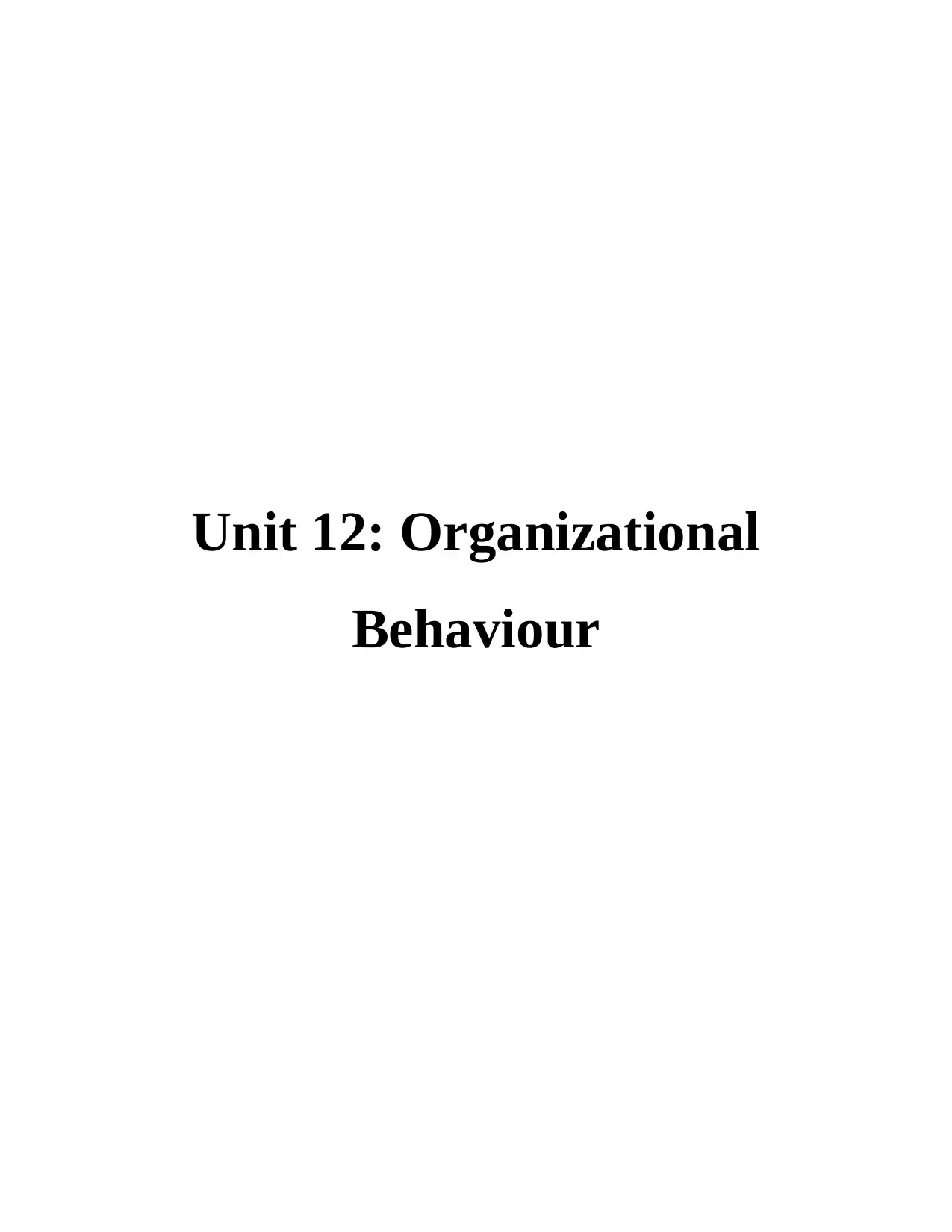
Unit 12: Organizational
Behaviour
Behaviour
Paraphrase This Document
Need a fresh take? Get an instant paraphrase of this document with our AI Paraphraser
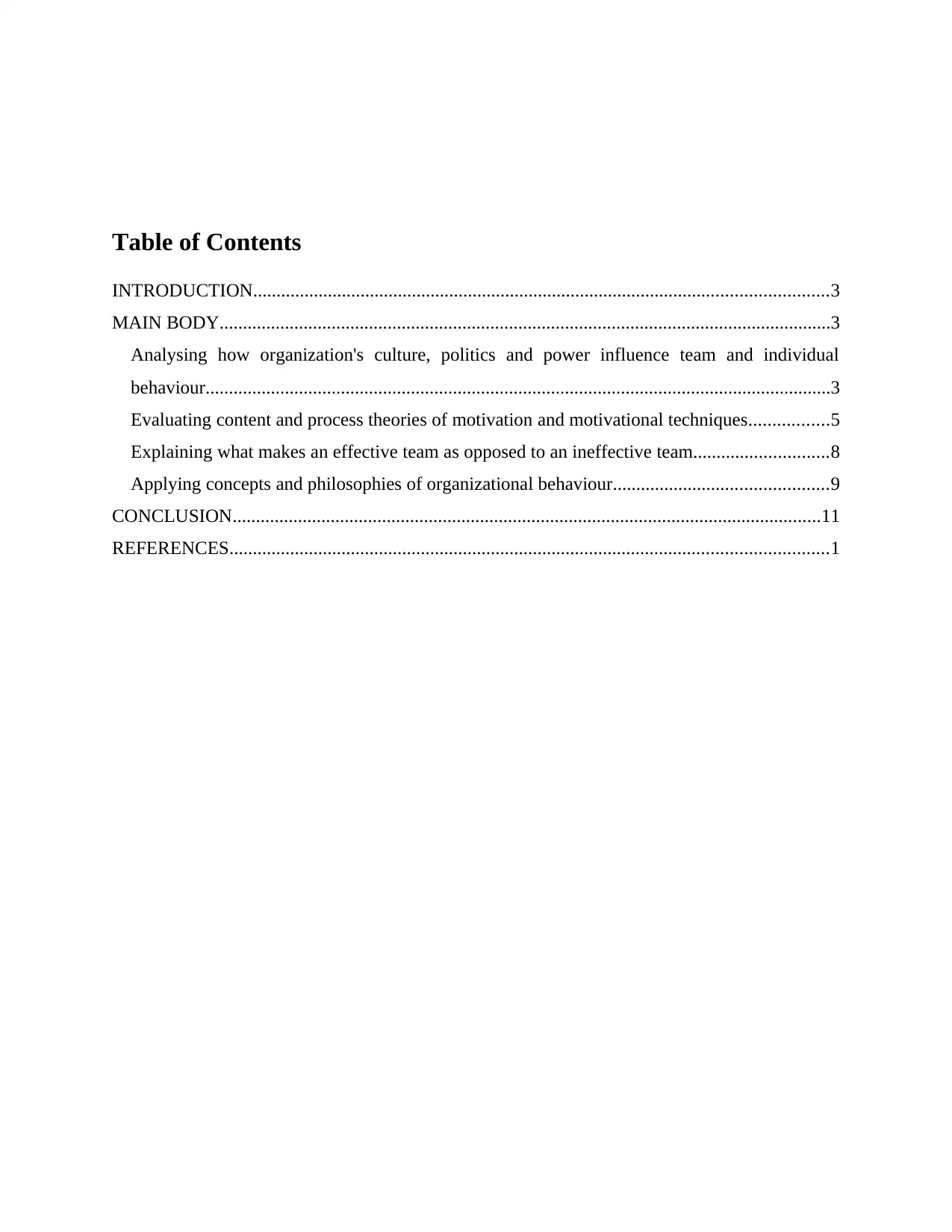
Table of Contents
INTRODUCTION...........................................................................................................................3
MAIN BODY...................................................................................................................................3
Analysing how organization's culture, politics and power influence team and individual
behaviour......................................................................................................................................3
Evaluating content and process theories of motivation and motivational techniques.................5
Explaining what makes an effective team as opposed to an ineffective team.............................8
Applying concepts and philosophies of organizational behaviour..............................................9
CONCLUSION..............................................................................................................................11
REFERENCES................................................................................................................................1
INTRODUCTION...........................................................................................................................3
MAIN BODY...................................................................................................................................3
Analysing how organization's culture, politics and power influence team and individual
behaviour......................................................................................................................................3
Evaluating content and process theories of motivation and motivational techniques.................5
Explaining what makes an effective team as opposed to an ineffective team.............................8
Applying concepts and philosophies of organizational behaviour..............................................9
CONCLUSION..............................................................................................................................11
REFERENCES................................................................................................................................1
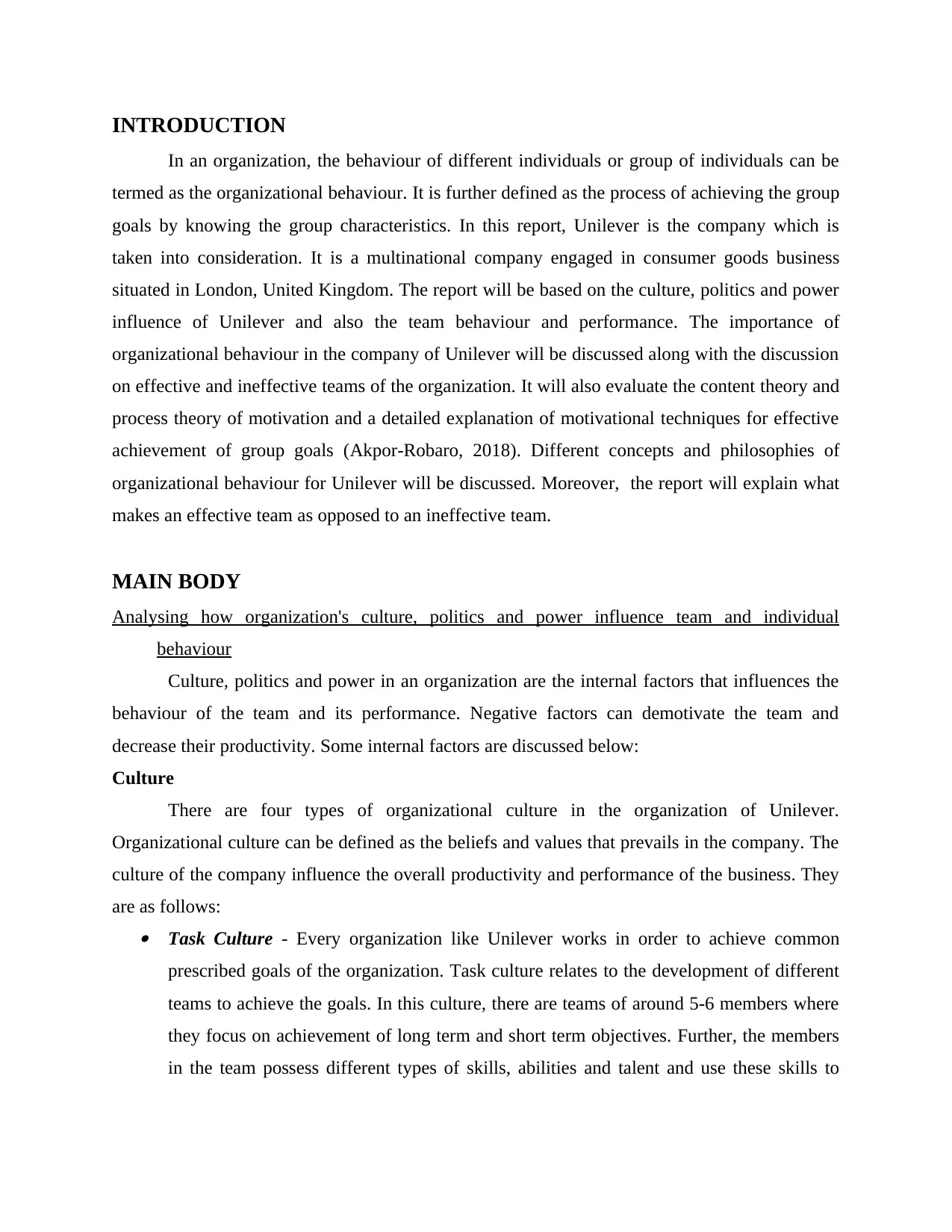
INTRODUCTION
In an organization, the behaviour of different individuals or group of individuals can be
termed as the organizational behaviour. It is further defined as the process of achieving the group
goals by knowing the group characteristics. In this report, Unilever is the company which is
taken into consideration. It is a multinational company engaged in consumer goods business
situated in London, United Kingdom. The report will be based on the culture, politics and power
influence of Unilever and also the team behaviour and performance. The importance of
organizational behaviour in the company of Unilever will be discussed along with the discussion
on effective and ineffective teams of the organization. It will also evaluate the content theory and
process theory of motivation and a detailed explanation of motivational techniques for effective
achievement of group goals (Akpor-Robaro, 2018). Different concepts and philosophies of
organizational behaviour for Unilever will be discussed. Moreover, the report will explain what
makes an effective team as opposed to an ineffective team.
MAIN BODY
Analysing how organization's culture, politics and power influence team and individual
behaviour
Culture, politics and power in an organization are the internal factors that influences the
behaviour of the team and its performance. Negative factors can demotivate the team and
decrease their productivity. Some internal factors are discussed below:
Culture
There are four types of organizational culture in the organization of Unilever.
Organizational culture can be defined as the beliefs and values that prevails in the company. The
culture of the company influence the overall productivity and performance of the business. They
are as follows: Task Culture - Every organization like Unilever works in order to achieve common
prescribed goals of the organization. Task culture relates to the development of different
teams to achieve the goals. In this culture, there are teams of around 5-6 members where
they focus on achievement of long term and short term objectives. Further, the members
in the team possess different types of skills, abilities and talent and use these skills to
In an organization, the behaviour of different individuals or group of individuals can be
termed as the organizational behaviour. It is further defined as the process of achieving the group
goals by knowing the group characteristics. In this report, Unilever is the company which is
taken into consideration. It is a multinational company engaged in consumer goods business
situated in London, United Kingdom. The report will be based on the culture, politics and power
influence of Unilever and also the team behaviour and performance. The importance of
organizational behaviour in the company of Unilever will be discussed along with the discussion
on effective and ineffective teams of the organization. It will also evaluate the content theory and
process theory of motivation and a detailed explanation of motivational techniques for effective
achievement of group goals (Akpor-Robaro, 2018). Different concepts and philosophies of
organizational behaviour for Unilever will be discussed. Moreover, the report will explain what
makes an effective team as opposed to an ineffective team.
MAIN BODY
Analysing how organization's culture, politics and power influence team and individual
behaviour
Culture, politics and power in an organization are the internal factors that influences the
behaviour of the team and its performance. Negative factors can demotivate the team and
decrease their productivity. Some internal factors are discussed below:
Culture
There are four types of organizational culture in the organization of Unilever.
Organizational culture can be defined as the beliefs and values that prevails in the company. The
culture of the company influence the overall productivity and performance of the business. They
are as follows: Task Culture - Every organization like Unilever works in order to achieve common
prescribed goals of the organization. Task culture relates to the development of different
teams to achieve the goals. In this culture, there are teams of around 5-6 members where
they focus on achievement of long term and short term objectives. Further, the members
in the team possess different types of skills, abilities and talent and use these skills to
⊘ This is a preview!⊘
Do you want full access?
Subscribe today to unlock all pages.

Trusted by 1+ million students worldwide
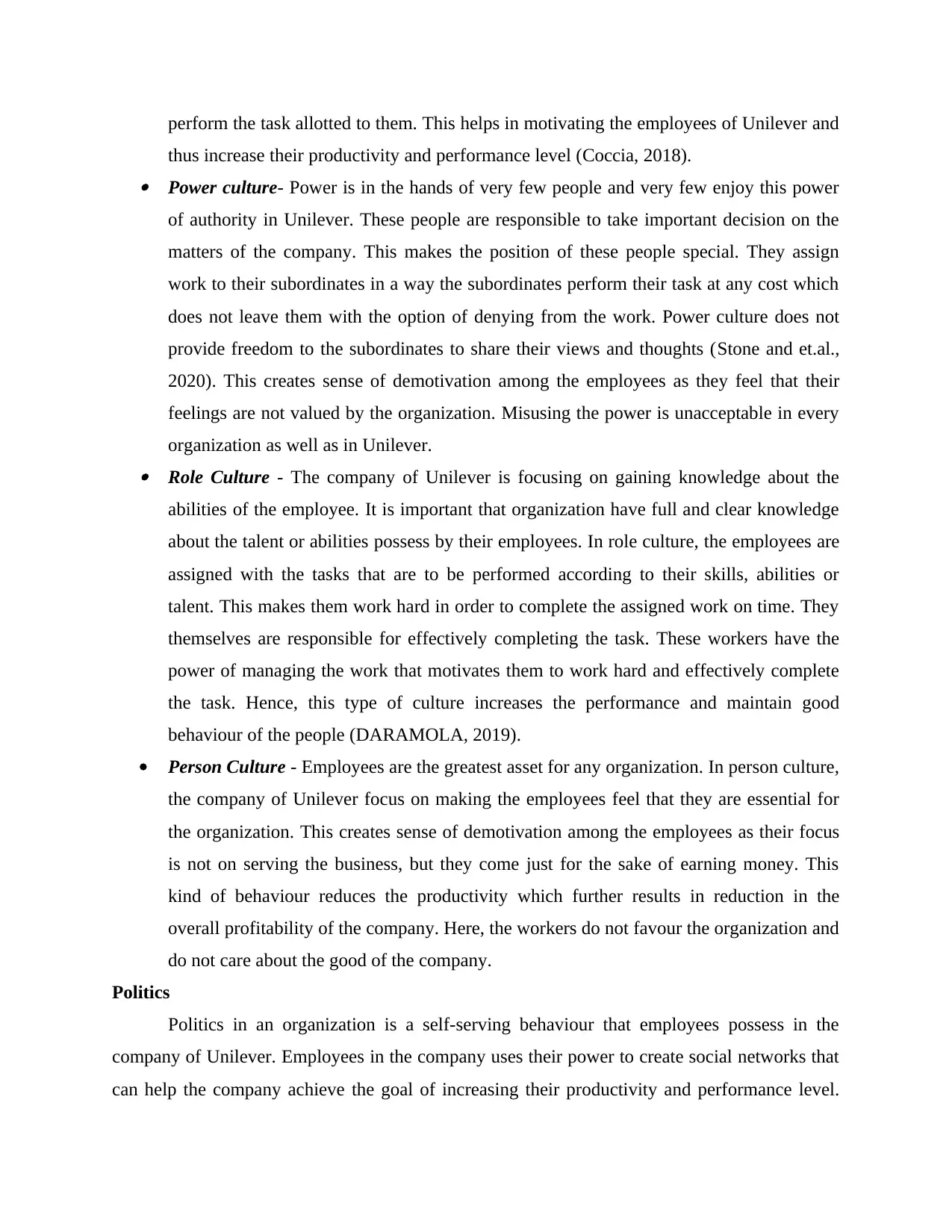
perform the task allotted to them. This helps in motivating the employees of Unilever and
thus increase their productivity and performance level (Coccia, 2018). Power culture- Power is in the hands of very few people and very few enjoy this power
of authority in Unilever. These people are responsible to take important decision on the
matters of the company. This makes the position of these people special. They assign
work to their subordinates in a way the subordinates perform their task at any cost which
does not leave them with the option of denying from the work. Power culture does not
provide freedom to the subordinates to share their views and thoughts (Stone and et.al.,
2020). This creates sense of demotivation among the employees as they feel that their
feelings are not valued by the organization. Misusing the power is unacceptable in every
organization as well as in Unilever. Role Culture - The company of Unilever is focusing on gaining knowledge about the
abilities of the employee. It is important that organization have full and clear knowledge
about the talent or abilities possess by their employees. In role culture, the employees are
assigned with the tasks that are to be performed according to their skills, abilities or
talent. This makes them work hard in order to complete the assigned work on time. They
themselves are responsible for effectively completing the task. These workers have the
power of managing the work that motivates them to work hard and effectively complete
the task. Hence, this type of culture increases the performance and maintain good
behaviour of the people (DARAMOLA, 2019).
Person Culture - Employees are the greatest asset for any organization. In person culture,
the company of Unilever focus on making the employees feel that they are essential for
the organization. This creates sense of demotivation among the employees as their focus
is not on serving the business, but they come just for the sake of earning money. This
kind of behaviour reduces the productivity which further results in reduction in the
overall profitability of the company. Here, the workers do not favour the organization and
do not care about the good of the company.
Politics
Politics in an organization is a self-serving behaviour that employees possess in the
company of Unilever. Employees in the company uses their power to create social networks that
can help the company achieve the goal of increasing their productivity and performance level.
thus increase their productivity and performance level (Coccia, 2018). Power culture- Power is in the hands of very few people and very few enjoy this power
of authority in Unilever. These people are responsible to take important decision on the
matters of the company. This makes the position of these people special. They assign
work to their subordinates in a way the subordinates perform their task at any cost which
does not leave them with the option of denying from the work. Power culture does not
provide freedom to the subordinates to share their views and thoughts (Stone and et.al.,
2020). This creates sense of demotivation among the employees as they feel that their
feelings are not valued by the organization. Misusing the power is unacceptable in every
organization as well as in Unilever. Role Culture - The company of Unilever is focusing on gaining knowledge about the
abilities of the employee. It is important that organization have full and clear knowledge
about the talent or abilities possess by their employees. In role culture, the employees are
assigned with the tasks that are to be performed according to their skills, abilities or
talent. This makes them work hard in order to complete the assigned work on time. They
themselves are responsible for effectively completing the task. These workers have the
power of managing the work that motivates them to work hard and effectively complete
the task. Hence, this type of culture increases the performance and maintain good
behaviour of the people (DARAMOLA, 2019).
Person Culture - Employees are the greatest asset for any organization. In person culture,
the company of Unilever focus on making the employees feel that they are essential for
the organization. This creates sense of demotivation among the employees as their focus
is not on serving the business, but they come just for the sake of earning money. This
kind of behaviour reduces the productivity which further results in reduction in the
overall profitability of the company. Here, the workers do not favour the organization and
do not care about the good of the company.
Politics
Politics in an organization is a self-serving behaviour that employees possess in the
company of Unilever. Employees in the company uses their power to create social networks that
can help the company achieve the goal of increasing their productivity and performance level.
Paraphrase This Document
Need a fresh take? Get an instant paraphrase of this document with our AI Paraphraser
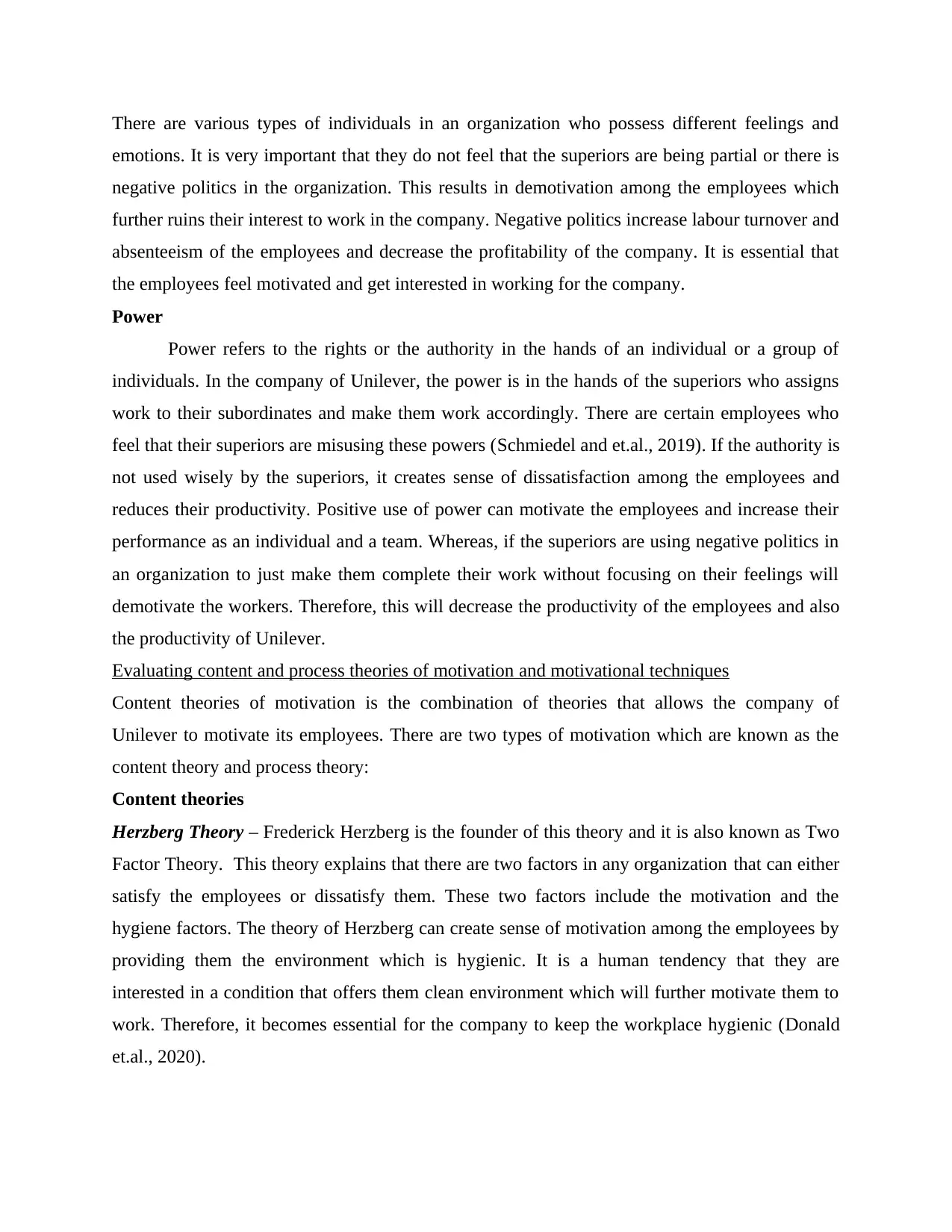
There are various types of individuals in an organization who possess different feelings and
emotions. It is very important that they do not feel that the superiors are being partial or there is
negative politics in the organization. This results in demotivation among the employees which
further ruins their interest to work in the company. Negative politics increase labour turnover and
absenteeism of the employees and decrease the profitability of the company. It is essential that
the employees feel motivated and get interested in working for the company.
Power
Power refers to the rights or the authority in the hands of an individual or a group of
individuals. In the company of Unilever, the power is in the hands of the superiors who assigns
work to their subordinates and make them work accordingly. There are certain employees who
feel that their superiors are misusing these powers (Schmiedel and et.al., 2019). If the authority is
not used wisely by the superiors, it creates sense of dissatisfaction among the employees and
reduces their productivity. Positive use of power can motivate the employees and increase their
performance as an individual and a team. Whereas, if the superiors are using negative politics in
an organization to just make them complete their work without focusing on their feelings will
demotivate the workers. Therefore, this will decrease the productivity of the employees and also
the productivity of Unilever.
Evaluating content and process theories of motivation and motivational techniques
Content theories of motivation is the combination of theories that allows the company of
Unilever to motivate its employees. There are two types of motivation which are known as the
content theory and process theory:
Content theories
Herzberg Theory – Frederick Herzberg is the founder of this theory and it is also known as Two
Factor Theory. This theory explains that there are two factors in any organization that can either
satisfy the employees or dissatisfy them. These two factors include the motivation and the
hygiene factors. The theory of Herzberg can create sense of motivation among the employees by
providing them the environment which is hygienic. It is a human tendency that they are
interested in a condition that offers them clean environment which will further motivate them to
work. Therefore, it becomes essential for the company to keep the workplace hygienic (Donald
et.al., 2020).
emotions. It is very important that they do not feel that the superiors are being partial or there is
negative politics in the organization. This results in demotivation among the employees which
further ruins their interest to work in the company. Negative politics increase labour turnover and
absenteeism of the employees and decrease the profitability of the company. It is essential that
the employees feel motivated and get interested in working for the company.
Power
Power refers to the rights or the authority in the hands of an individual or a group of
individuals. In the company of Unilever, the power is in the hands of the superiors who assigns
work to their subordinates and make them work accordingly. There are certain employees who
feel that their superiors are misusing these powers (Schmiedel and et.al., 2019). If the authority is
not used wisely by the superiors, it creates sense of dissatisfaction among the employees and
reduces their productivity. Positive use of power can motivate the employees and increase their
performance as an individual and a team. Whereas, if the superiors are using negative politics in
an organization to just make them complete their work without focusing on their feelings will
demotivate the workers. Therefore, this will decrease the productivity of the employees and also
the productivity of Unilever.
Evaluating content and process theories of motivation and motivational techniques
Content theories of motivation is the combination of theories that allows the company of
Unilever to motivate its employees. There are two types of motivation which are known as the
content theory and process theory:
Content theories
Herzberg Theory – Frederick Herzberg is the founder of this theory and it is also known as Two
Factor Theory. This theory explains that there are two factors in any organization that can either
satisfy the employees or dissatisfy them. These two factors include the motivation and the
hygiene factors. The theory of Herzberg can create sense of motivation among the employees by
providing them the environment which is hygienic. It is a human tendency that they are
interested in a condition that offers them clean environment which will further motivate them to
work. Therefore, it becomes essential for the company to keep the workplace hygienic (Donald
et.al., 2020).
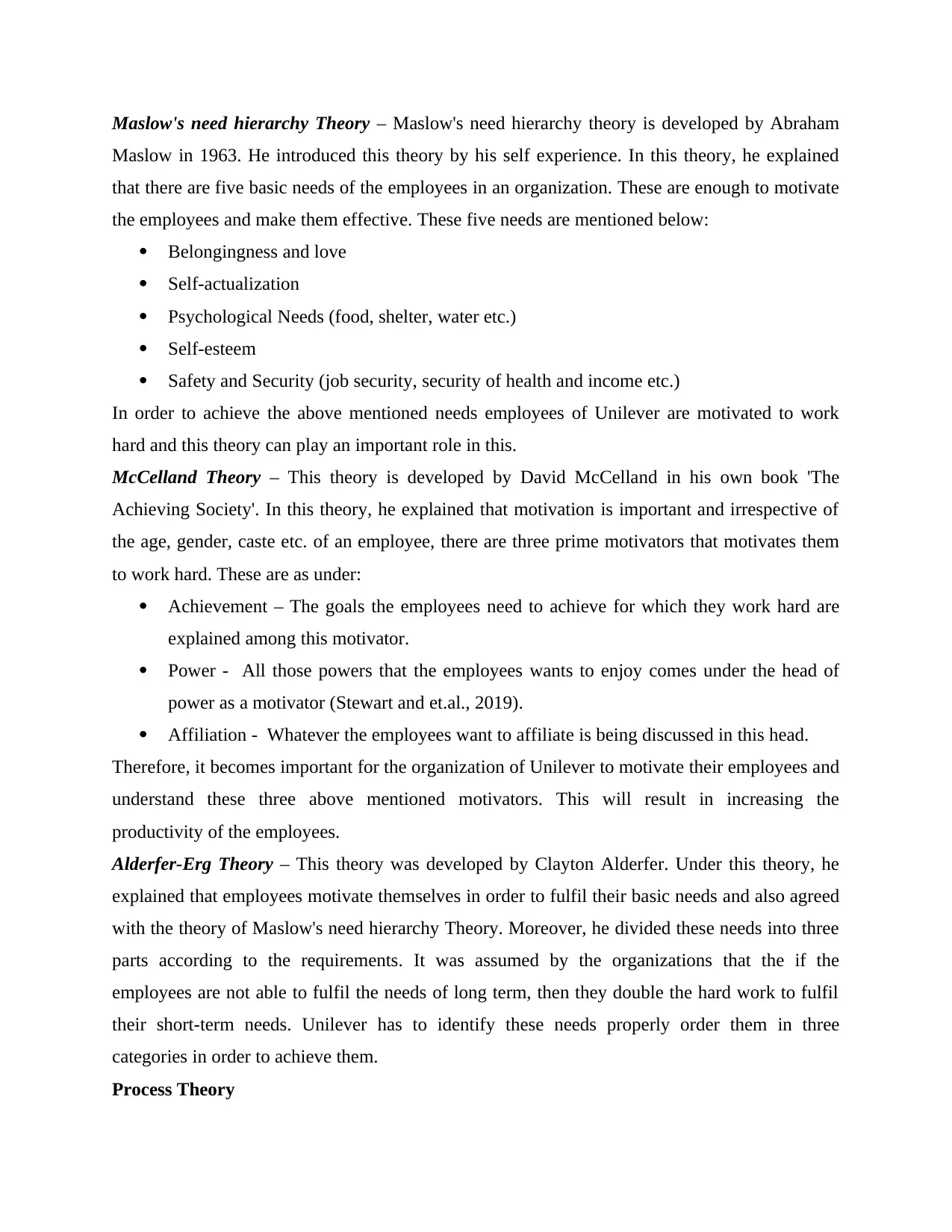
Maslow's need hierarchy Theory – Maslow's need hierarchy theory is developed by Abraham
Maslow in 1963. He introduced this theory by his self experience. In this theory, he explained
that there are five basic needs of the employees in an organization. These are enough to motivate
the employees and make them effective. These five needs are mentioned below:
Belongingness and love
Self-actualization
Psychological Needs (food, shelter, water etc.)
Self-esteem
Safety and Security (job security, security of health and income etc.)
In order to achieve the above mentioned needs employees of Unilever are motivated to work
hard and this theory can play an important role in this.
McCelland Theory – This theory is developed by David McCelland in his own book 'The
Achieving Society'. In this theory, he explained that motivation is important and irrespective of
the age, gender, caste etc. of an employee, there are three prime motivators that motivates them
to work hard. These are as under:
Achievement – The goals the employees need to achieve for which they work hard are
explained among this motivator.
Power - All those powers that the employees wants to enjoy comes under the head of
power as a motivator (Stewart and et.al., 2019).
Affiliation - Whatever the employees want to affiliate is being discussed in this head.
Therefore, it becomes important for the organization of Unilever to motivate their employees and
understand these three above mentioned motivators. This will result in increasing the
productivity of the employees.
Alderfer-Erg Theory – This theory was developed by Clayton Alderfer. Under this theory, he
explained that employees motivate themselves in order to fulfil their basic needs and also agreed
with the theory of Maslow's need hierarchy Theory. Moreover, he divided these needs into three
parts according to the requirements. It was assumed by the organizations that the if the
employees are not able to fulfil the needs of long term, then they double the hard work to fulfil
their short-term needs. Unilever has to identify these needs properly order them in three
categories in order to achieve them.
Process Theory
Maslow in 1963. He introduced this theory by his self experience. In this theory, he explained
that there are five basic needs of the employees in an organization. These are enough to motivate
the employees and make them effective. These five needs are mentioned below:
Belongingness and love
Self-actualization
Psychological Needs (food, shelter, water etc.)
Self-esteem
Safety and Security (job security, security of health and income etc.)
In order to achieve the above mentioned needs employees of Unilever are motivated to work
hard and this theory can play an important role in this.
McCelland Theory – This theory is developed by David McCelland in his own book 'The
Achieving Society'. In this theory, he explained that motivation is important and irrespective of
the age, gender, caste etc. of an employee, there are three prime motivators that motivates them
to work hard. These are as under:
Achievement – The goals the employees need to achieve for which they work hard are
explained among this motivator.
Power - All those powers that the employees wants to enjoy comes under the head of
power as a motivator (Stewart and et.al., 2019).
Affiliation - Whatever the employees want to affiliate is being discussed in this head.
Therefore, it becomes important for the organization of Unilever to motivate their employees and
understand these three above mentioned motivators. This will result in increasing the
productivity of the employees.
Alderfer-Erg Theory – This theory was developed by Clayton Alderfer. Under this theory, he
explained that employees motivate themselves in order to fulfil their basic needs and also agreed
with the theory of Maslow's need hierarchy Theory. Moreover, he divided these needs into three
parts according to the requirements. It was assumed by the organizations that the if the
employees are not able to fulfil the needs of long term, then they double the hard work to fulfil
their short-term needs. Unilever has to identify these needs properly order them in three
categories in order to achieve them.
Process Theory
⊘ This is a preview!⊘
Do you want full access?
Subscribe today to unlock all pages.

Trusted by 1+ million students worldwide
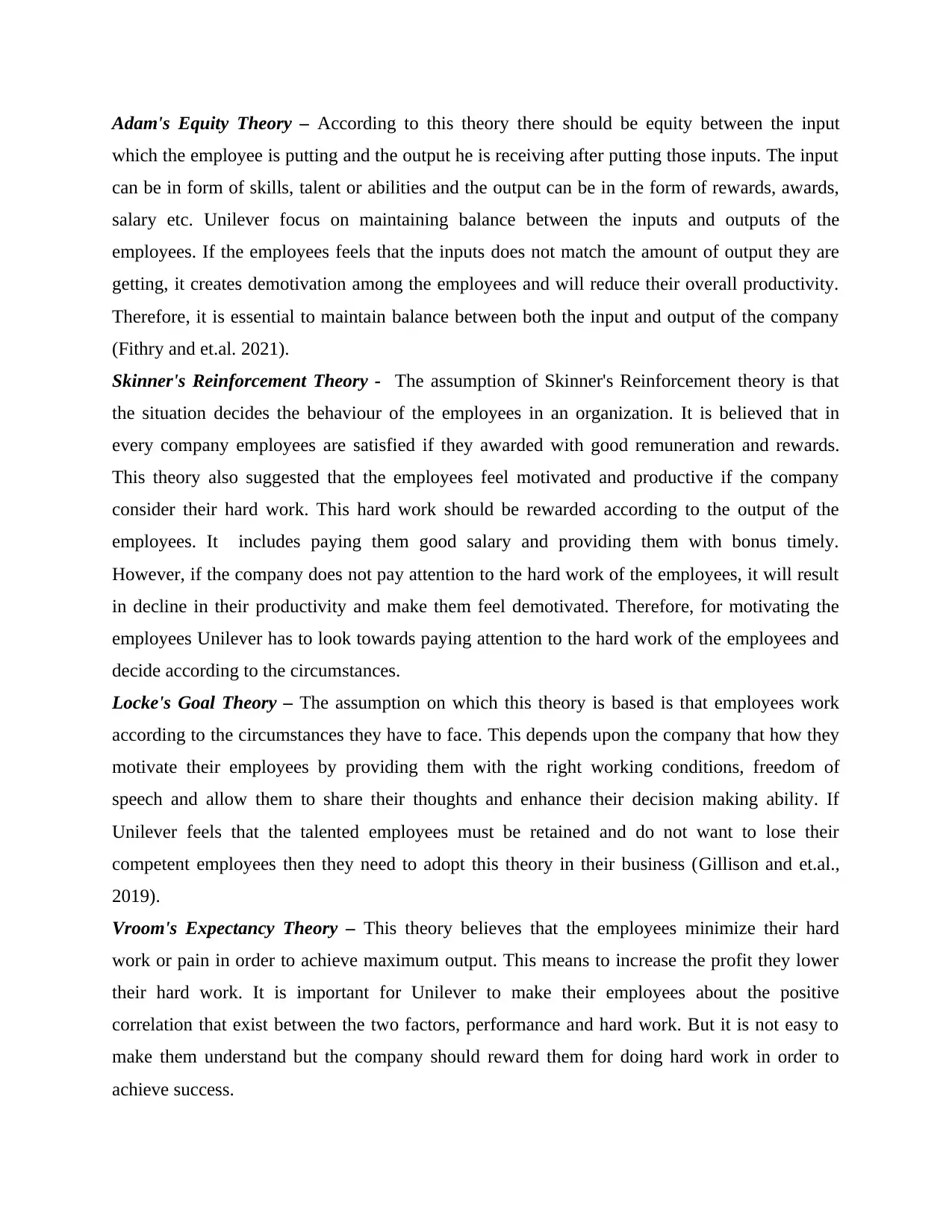
Adam's Equity Theory – According to this theory there should be equity between the input
which the employee is putting and the output he is receiving after putting those inputs. The input
can be in form of skills, talent or abilities and the output can be in the form of rewards, awards,
salary etc. Unilever focus on maintaining balance between the inputs and outputs of the
employees. If the employees feels that the inputs does not match the amount of output they are
getting, it creates demotivation among the employees and will reduce their overall productivity.
Therefore, it is essential to maintain balance between both the input and output of the company
(Fithry and et.al. 2021).
Skinner's Reinforcement Theory - The assumption of Skinner's Reinforcement theory is that
the situation decides the behaviour of the employees in an organization. It is believed that in
every company employees are satisfied if they awarded with good remuneration and rewards.
This theory also suggested that the employees feel motivated and productive if the company
consider their hard work. This hard work should be rewarded according to the output of the
employees. It includes paying them good salary and providing them with bonus timely.
However, if the company does not pay attention to the hard work of the employees, it will result
in decline in their productivity and make them feel demotivated. Therefore, for motivating the
employees Unilever has to look towards paying attention to the hard work of the employees and
decide according to the circumstances.
Locke's Goal Theory – The assumption on which this theory is based is that employees work
according to the circumstances they have to face. This depends upon the company that how they
motivate their employees by providing them with the right working conditions, freedom of
speech and allow them to share their thoughts and enhance their decision making ability. If
Unilever feels that the talented employees must be retained and do not want to lose their
competent employees then they need to adopt this theory in their business (Gillison and et.al.,
2019).
Vroom's Expectancy Theory – This theory believes that the employees minimize their hard
work or pain in order to achieve maximum output. This means to increase the profit they lower
their hard work. It is important for Unilever to make their employees about the positive
correlation that exist between the two factors, performance and hard work. But it is not easy to
make them understand but the company should reward them for doing hard work in order to
achieve success.
which the employee is putting and the output he is receiving after putting those inputs. The input
can be in form of skills, talent or abilities and the output can be in the form of rewards, awards,
salary etc. Unilever focus on maintaining balance between the inputs and outputs of the
employees. If the employees feels that the inputs does not match the amount of output they are
getting, it creates demotivation among the employees and will reduce their overall productivity.
Therefore, it is essential to maintain balance between both the input and output of the company
(Fithry and et.al. 2021).
Skinner's Reinforcement Theory - The assumption of Skinner's Reinforcement theory is that
the situation decides the behaviour of the employees in an organization. It is believed that in
every company employees are satisfied if they awarded with good remuneration and rewards.
This theory also suggested that the employees feel motivated and productive if the company
consider their hard work. This hard work should be rewarded according to the output of the
employees. It includes paying them good salary and providing them with bonus timely.
However, if the company does not pay attention to the hard work of the employees, it will result
in decline in their productivity and make them feel demotivated. Therefore, for motivating the
employees Unilever has to look towards paying attention to the hard work of the employees and
decide according to the circumstances.
Locke's Goal Theory – The assumption on which this theory is based is that employees work
according to the circumstances they have to face. This depends upon the company that how they
motivate their employees by providing them with the right working conditions, freedom of
speech and allow them to share their thoughts and enhance their decision making ability. If
Unilever feels that the talented employees must be retained and do not want to lose their
competent employees then they need to adopt this theory in their business (Gillison and et.al.,
2019).
Vroom's Expectancy Theory – This theory believes that the employees minimize their hard
work or pain in order to achieve maximum output. This means to increase the profit they lower
their hard work. It is important for Unilever to make their employees about the positive
correlation that exist between the two factors, performance and hard work. But it is not easy to
make them understand but the company should reward them for doing hard work in order to
achieve success.
Paraphrase This Document
Need a fresh take? Get an instant paraphrase of this document with our AI Paraphraser
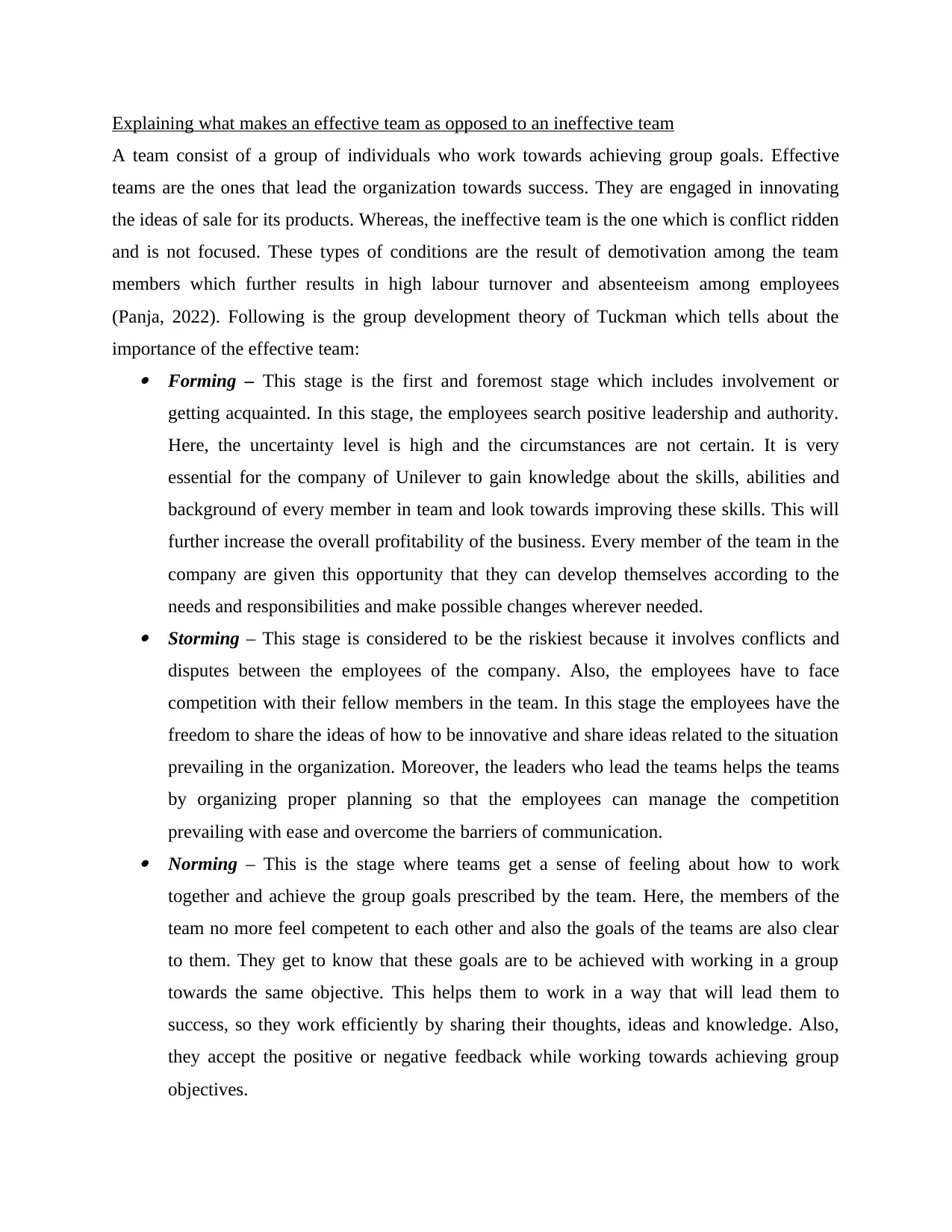
Explaining what makes an effective team as opposed to an ineffective team
A team consist of a group of individuals who work towards achieving group goals. Effective
teams are the ones that lead the organization towards success. They are engaged in innovating
the ideas of sale for its products. Whereas, the ineffective team is the one which is conflict ridden
and is not focused. These types of conditions are the result of demotivation among the team
members which further results in high labour turnover and absenteeism among employees
(Panja, 2022). Following is the group development theory of Tuckman which tells about the
importance of the effective team: Forming – This stage is the first and foremost stage which includes involvement or
getting acquainted. In this stage, the employees search positive leadership and authority.
Here, the uncertainty level is high and the circumstances are not certain. It is very
essential for the company of Unilever to gain knowledge about the skills, abilities and
background of every member in team and look towards improving these skills. This will
further increase the overall profitability of the business. Every member of the team in the
company are given this opportunity that they can develop themselves according to the
needs and responsibilities and make possible changes wherever needed. Storming – This stage is considered to be the riskiest because it involves conflicts and
disputes between the employees of the company. Also, the employees have to face
competition with their fellow members in the team. In this stage the employees have the
freedom to share the ideas of how to be innovative and share ideas related to the situation
prevailing in the organization. Moreover, the leaders who lead the teams helps the teams
by organizing proper planning so that the employees can manage the competition
prevailing with ease and overcome the barriers of communication. Norming – This is the stage where teams get a sense of feeling about how to work
together and achieve the group goals prescribed by the team. Here, the members of the
team no more feel competent to each other and also the goals of the teams are also clear
to them. They get to know that these goals are to be achieved with working in a group
towards the same objective. This helps them to work in a way that will lead them to
success, so they work efficiently by sharing their thoughts, ideas and knowledge. Also,
they accept the positive or negative feedback while working towards achieving group
objectives.
A team consist of a group of individuals who work towards achieving group goals. Effective
teams are the ones that lead the organization towards success. They are engaged in innovating
the ideas of sale for its products. Whereas, the ineffective team is the one which is conflict ridden
and is not focused. These types of conditions are the result of demotivation among the team
members which further results in high labour turnover and absenteeism among employees
(Panja, 2022). Following is the group development theory of Tuckman which tells about the
importance of the effective team: Forming – This stage is the first and foremost stage which includes involvement or
getting acquainted. In this stage, the employees search positive leadership and authority.
Here, the uncertainty level is high and the circumstances are not certain. It is very
essential for the company of Unilever to gain knowledge about the skills, abilities and
background of every member in team and look towards improving these skills. This will
further increase the overall profitability of the business. Every member of the team in the
company are given this opportunity that they can develop themselves according to the
needs and responsibilities and make possible changes wherever needed. Storming – This stage is considered to be the riskiest because it involves conflicts and
disputes between the employees of the company. Also, the employees have to face
competition with their fellow members in the team. In this stage the employees have the
freedom to share the ideas of how to be innovative and share ideas related to the situation
prevailing in the organization. Moreover, the leaders who lead the teams helps the teams
by organizing proper planning so that the employees can manage the competition
prevailing with ease and overcome the barriers of communication. Norming – This is the stage where teams get a sense of feeling about how to work
together and achieve the group goals prescribed by the team. Here, the members of the
team no more feel competent to each other and also the goals of the teams are also clear
to them. They get to know that these goals are to be achieved with working in a group
towards the same objective. This helps them to work in a way that will lead them to
success, so they work efficiently by sharing their thoughts, ideas and knowledge. Also,
they accept the positive or negative feedback while working towards achieving group
objectives.
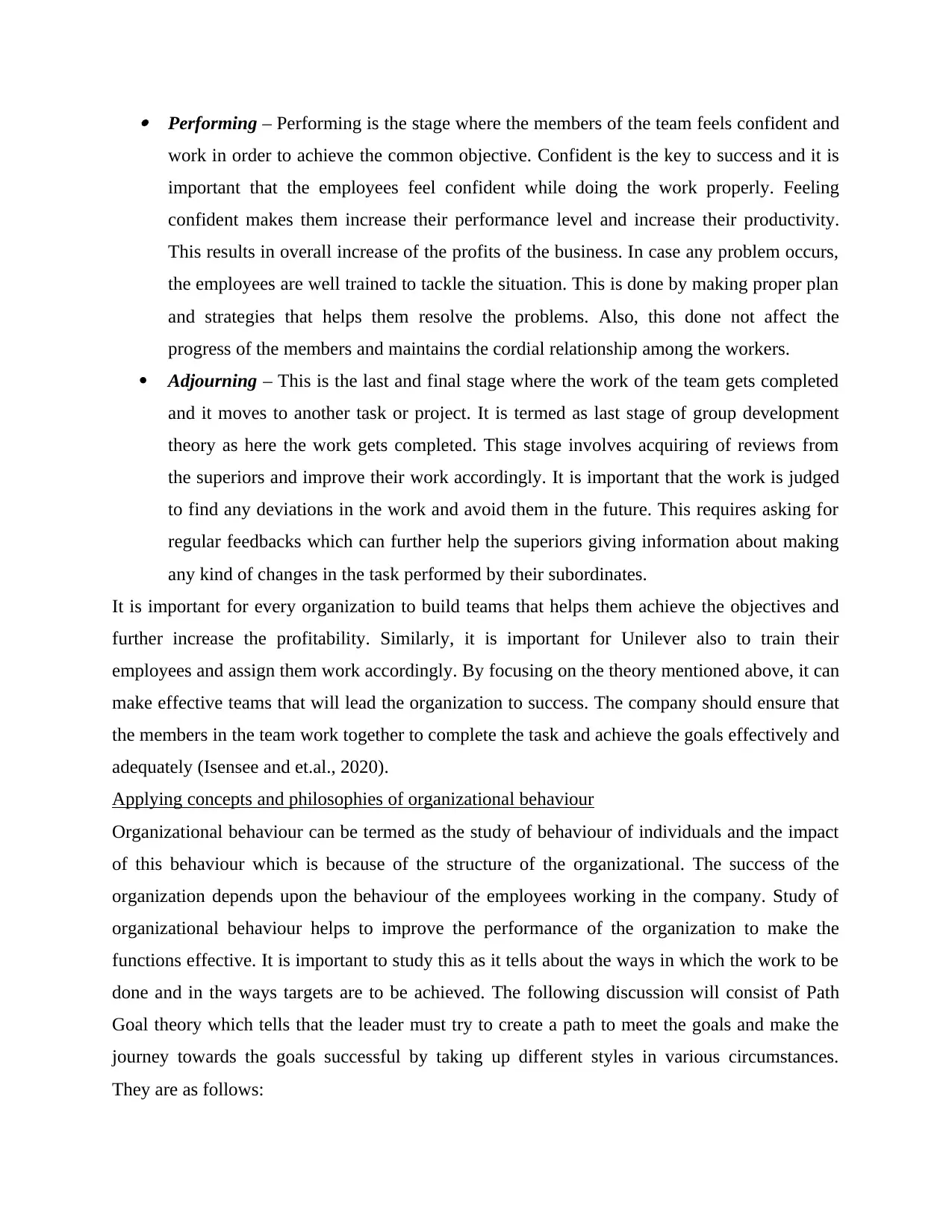
Performing – Performing is the stage where the members of the team feels confident and
work in order to achieve the common objective. Confident is the key to success and it is
important that the employees feel confident while doing the work properly. Feeling
confident makes them increase their performance level and increase their productivity.
This results in overall increase of the profits of the business. In case any problem occurs,
the employees are well trained to tackle the situation. This is done by making proper plan
and strategies that helps them resolve the problems. Also, this done not affect the
progress of the members and maintains the cordial relationship among the workers.
Adjourning – This is the last and final stage where the work of the team gets completed
and it moves to another task or project. It is termed as last stage of group development
theory as here the work gets completed. This stage involves acquiring of reviews from
the superiors and improve their work accordingly. It is important that the work is judged
to find any deviations in the work and avoid them in the future. This requires asking for
regular feedbacks which can further help the superiors giving information about making
any kind of changes in the task performed by their subordinates.
It is important for every organization to build teams that helps them achieve the objectives and
further increase the profitability. Similarly, it is important for Unilever also to train their
employees and assign them work accordingly. By focusing on the theory mentioned above, it can
make effective teams that will lead the organization to success. The company should ensure that
the members in the team work together to complete the task and achieve the goals effectively and
adequately (Isensee and et.al., 2020).
Applying concepts and philosophies of organizational behaviour
Organizational behaviour can be termed as the study of behaviour of individuals and the impact
of this behaviour which is because of the structure of the organizational. The success of the
organization depends upon the behaviour of the employees working in the company. Study of
organizational behaviour helps to improve the performance of the organization to make the
functions effective. It is important to study this as it tells about the ways in which the work to be
done and in the ways targets are to be achieved. The following discussion will consist of Path
Goal theory which tells that the leader must try to create a path to meet the goals and make the
journey towards the goals successful by taking up different styles in various circumstances.
They are as follows:
work in order to achieve the common objective. Confident is the key to success and it is
important that the employees feel confident while doing the work properly. Feeling
confident makes them increase their performance level and increase their productivity.
This results in overall increase of the profits of the business. In case any problem occurs,
the employees are well trained to tackle the situation. This is done by making proper plan
and strategies that helps them resolve the problems. Also, this done not affect the
progress of the members and maintains the cordial relationship among the workers.
Adjourning – This is the last and final stage where the work of the team gets completed
and it moves to another task or project. It is termed as last stage of group development
theory as here the work gets completed. This stage involves acquiring of reviews from
the superiors and improve their work accordingly. It is important that the work is judged
to find any deviations in the work and avoid them in the future. This requires asking for
regular feedbacks which can further help the superiors giving information about making
any kind of changes in the task performed by their subordinates.
It is important for every organization to build teams that helps them achieve the objectives and
further increase the profitability. Similarly, it is important for Unilever also to train their
employees and assign them work accordingly. By focusing on the theory mentioned above, it can
make effective teams that will lead the organization to success. The company should ensure that
the members in the team work together to complete the task and achieve the goals effectively and
adequately (Isensee and et.al., 2020).
Applying concepts and philosophies of organizational behaviour
Organizational behaviour can be termed as the study of behaviour of individuals and the impact
of this behaviour which is because of the structure of the organizational. The success of the
organization depends upon the behaviour of the employees working in the company. Study of
organizational behaviour helps to improve the performance of the organization to make the
functions effective. It is important to study this as it tells about the ways in which the work to be
done and in the ways targets are to be achieved. The following discussion will consist of Path
Goal theory which tells that the leader must try to create a path to meet the goals and make the
journey towards the goals successful by taking up different styles in various circumstances.
They are as follows:
⊘ This is a preview!⊘
Do you want full access?
Subscribe today to unlock all pages.

Trusted by 1+ million students worldwide
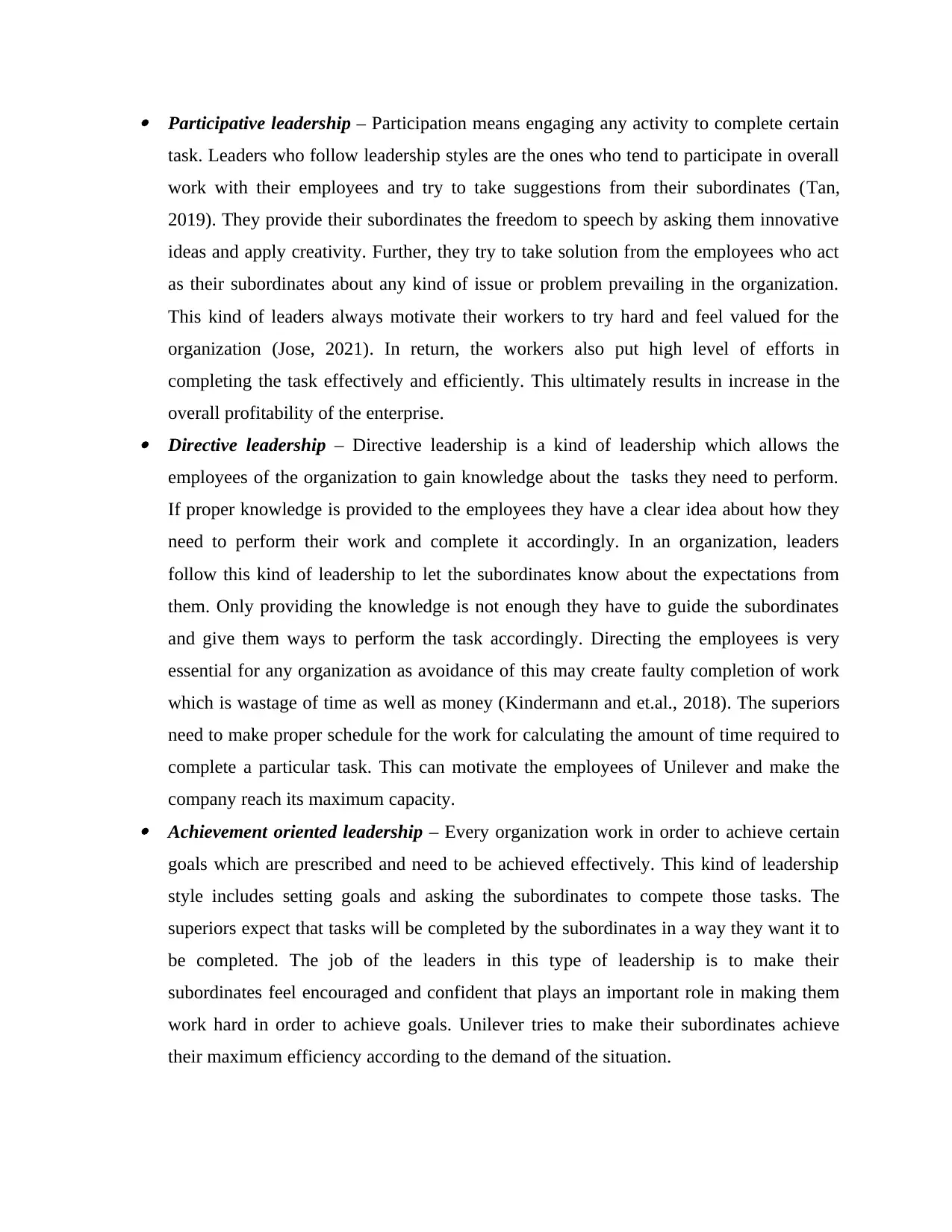
Participative leadership – Participation means engaging any activity to complete certain
task. Leaders who follow leadership styles are the ones who tend to participate in overall
work with their employees and try to take suggestions from their subordinates (Tan,
2019). They provide their subordinates the freedom to speech by asking them innovative
ideas and apply creativity. Further, they try to take solution from the employees who act
as their subordinates about any kind of issue or problem prevailing in the organization.
This kind of leaders always motivate their workers to try hard and feel valued for the
organization (Jose, 2021). In return, the workers also put high level of efforts in
completing the task effectively and efficiently. This ultimately results in increase in the
overall profitability of the enterprise. Directive leadership – Directive leadership is a kind of leadership which allows the
employees of the organization to gain knowledge about the tasks they need to perform.
If proper knowledge is provided to the employees they have a clear idea about how they
need to perform their work and complete it accordingly. In an organization, leaders
follow this kind of leadership to let the subordinates know about the expectations from
them. Only providing the knowledge is not enough they have to guide the subordinates
and give them ways to perform the task accordingly. Directing the employees is very
essential for any organization as avoidance of this may create faulty completion of work
which is wastage of time as well as money (Kindermann and et.al., 2018). The superiors
need to make proper schedule for the work for calculating the amount of time required to
complete a particular task. This can motivate the employees of Unilever and make the
company reach its maximum capacity. Achievement oriented leadership – Every organization work in order to achieve certain
goals which are prescribed and need to be achieved effectively. This kind of leadership
style includes setting goals and asking the subordinates to compete those tasks. The
superiors expect that tasks will be completed by the subordinates in a way they want it to
be completed. The job of the leaders in this type of leadership is to make their
subordinates feel encouraged and confident that plays an important role in making them
work hard in order to achieve goals. Unilever tries to make their subordinates achieve
their maximum efficiency according to the demand of the situation.
task. Leaders who follow leadership styles are the ones who tend to participate in overall
work with their employees and try to take suggestions from their subordinates (Tan,
2019). They provide their subordinates the freedom to speech by asking them innovative
ideas and apply creativity. Further, they try to take solution from the employees who act
as their subordinates about any kind of issue or problem prevailing in the organization.
This kind of leaders always motivate their workers to try hard and feel valued for the
organization (Jose, 2021). In return, the workers also put high level of efforts in
completing the task effectively and efficiently. This ultimately results in increase in the
overall profitability of the enterprise. Directive leadership – Directive leadership is a kind of leadership which allows the
employees of the organization to gain knowledge about the tasks they need to perform.
If proper knowledge is provided to the employees they have a clear idea about how they
need to perform their work and complete it accordingly. In an organization, leaders
follow this kind of leadership to let the subordinates know about the expectations from
them. Only providing the knowledge is not enough they have to guide the subordinates
and give them ways to perform the task accordingly. Directing the employees is very
essential for any organization as avoidance of this may create faulty completion of work
which is wastage of time as well as money (Kindermann and et.al., 2018). The superiors
need to make proper schedule for the work for calculating the amount of time required to
complete a particular task. This can motivate the employees of Unilever and make the
company reach its maximum capacity. Achievement oriented leadership – Every organization work in order to achieve certain
goals which are prescribed and need to be achieved effectively. This kind of leadership
style includes setting goals and asking the subordinates to compete those tasks. The
superiors expect that tasks will be completed by the subordinates in a way they want it to
be completed. The job of the leaders in this type of leadership is to make their
subordinates feel encouraged and confident that plays an important role in making them
work hard in order to achieve goals. Unilever tries to make their subordinates achieve
their maximum efficiency according to the demand of the situation.
Paraphrase This Document
Need a fresh take? Get an instant paraphrase of this document with our AI Paraphraser
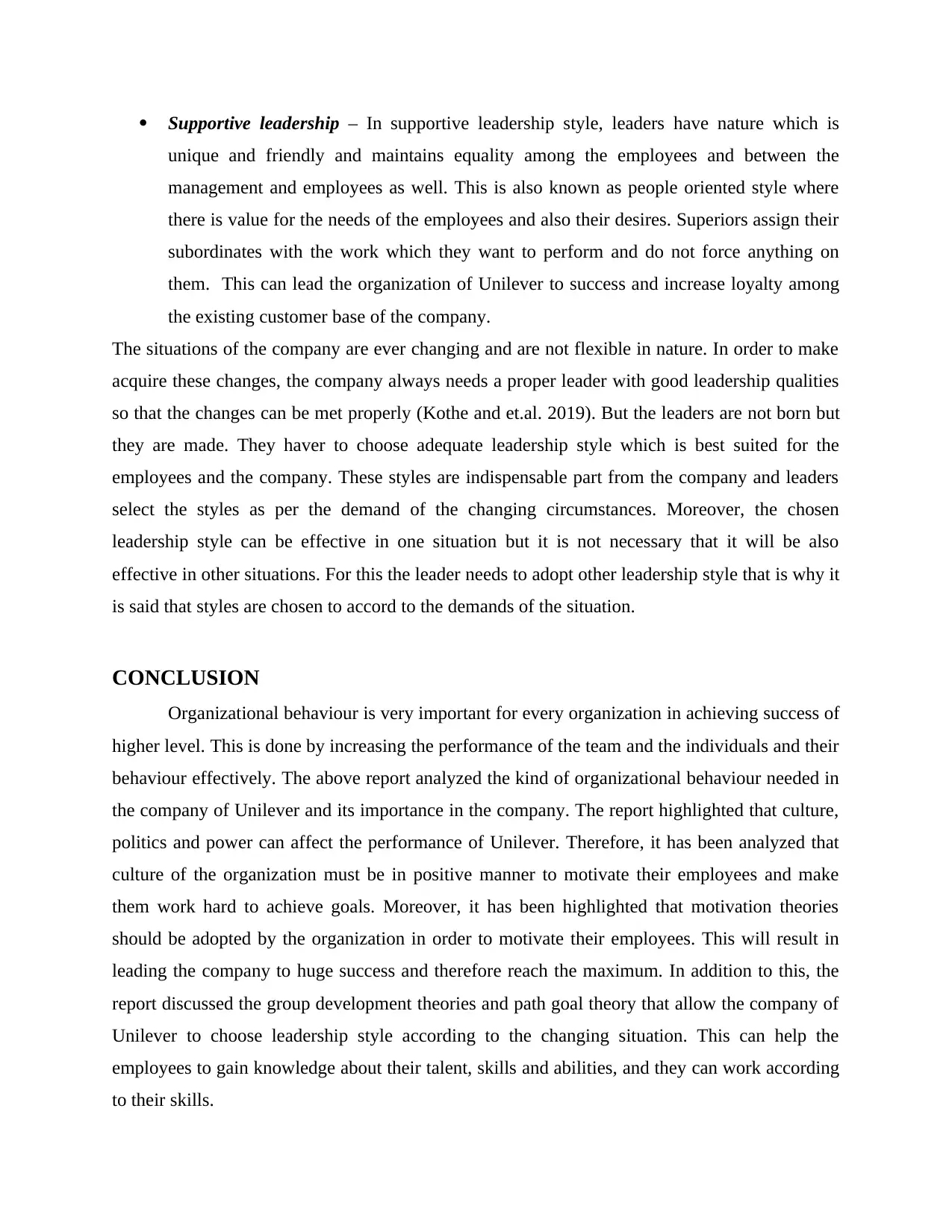
Supportive leadership – In supportive leadership style, leaders have nature which is
unique and friendly and maintains equality among the employees and between the
management and employees as well. This is also known as people oriented style where
there is value for the needs of the employees and also their desires. Superiors assign their
subordinates with the work which they want to perform and do not force anything on
them. This can lead the organization of Unilever to success and increase loyalty among
the existing customer base of the company.
The situations of the company are ever changing and are not flexible in nature. In order to make
acquire these changes, the company always needs a proper leader with good leadership qualities
so that the changes can be met properly (Kothe and et.al. 2019). But the leaders are not born but
they are made. They haver to choose adequate leadership style which is best suited for the
employees and the company. These styles are indispensable part from the company and leaders
select the styles as per the demand of the changing circumstances. Moreover, the chosen
leadership style can be effective in one situation but it is not necessary that it will be also
effective in other situations. For this the leader needs to adopt other leadership style that is why it
is said that styles are chosen to accord to the demands of the situation.
CONCLUSION
Organizational behaviour is very important for every organization in achieving success of
higher level. This is done by increasing the performance of the team and the individuals and their
behaviour effectively. The above report analyzed the kind of organizational behaviour needed in
the company of Unilever and its importance in the company. The report highlighted that culture,
politics and power can affect the performance of Unilever. Therefore, it has been analyzed that
culture of the organization must be in positive manner to motivate their employees and make
them work hard to achieve goals. Moreover, it has been highlighted that motivation theories
should be adopted by the organization in order to motivate their employees. This will result in
leading the company to huge success and therefore reach the maximum. In addition to this, the
report discussed the group development theories and path goal theory that allow the company of
Unilever to choose leadership style according to the changing situation. This can help the
employees to gain knowledge about their talent, skills and abilities, and they can work according
to their skills.
unique and friendly and maintains equality among the employees and between the
management and employees as well. This is also known as people oriented style where
there is value for the needs of the employees and also their desires. Superiors assign their
subordinates with the work which they want to perform and do not force anything on
them. This can lead the organization of Unilever to success and increase loyalty among
the existing customer base of the company.
The situations of the company are ever changing and are not flexible in nature. In order to make
acquire these changes, the company always needs a proper leader with good leadership qualities
so that the changes can be met properly (Kothe and et.al. 2019). But the leaders are not born but
they are made. They haver to choose adequate leadership style which is best suited for the
employees and the company. These styles are indispensable part from the company and leaders
select the styles as per the demand of the changing circumstances. Moreover, the chosen
leadership style can be effective in one situation but it is not necessary that it will be also
effective in other situations. For this the leader needs to adopt other leadership style that is why it
is said that styles are chosen to accord to the demands of the situation.
CONCLUSION
Organizational behaviour is very important for every organization in achieving success of
higher level. This is done by increasing the performance of the team and the individuals and their
behaviour effectively. The above report analyzed the kind of organizational behaviour needed in
the company of Unilever and its importance in the company. The report highlighted that culture,
politics and power can affect the performance of Unilever. Therefore, it has been analyzed that
culture of the organization must be in positive manner to motivate their employees and make
them work hard to achieve goals. Moreover, it has been highlighted that motivation theories
should be adopted by the organization in order to motivate their employees. This will result in
leading the company to huge success and therefore reach the maximum. In addition to this, the
report discussed the group development theories and path goal theory that allow the company of
Unilever to choose leadership style according to the changing situation. This can help the
employees to gain knowledge about their talent, skills and abilities, and they can work according
to their skills.
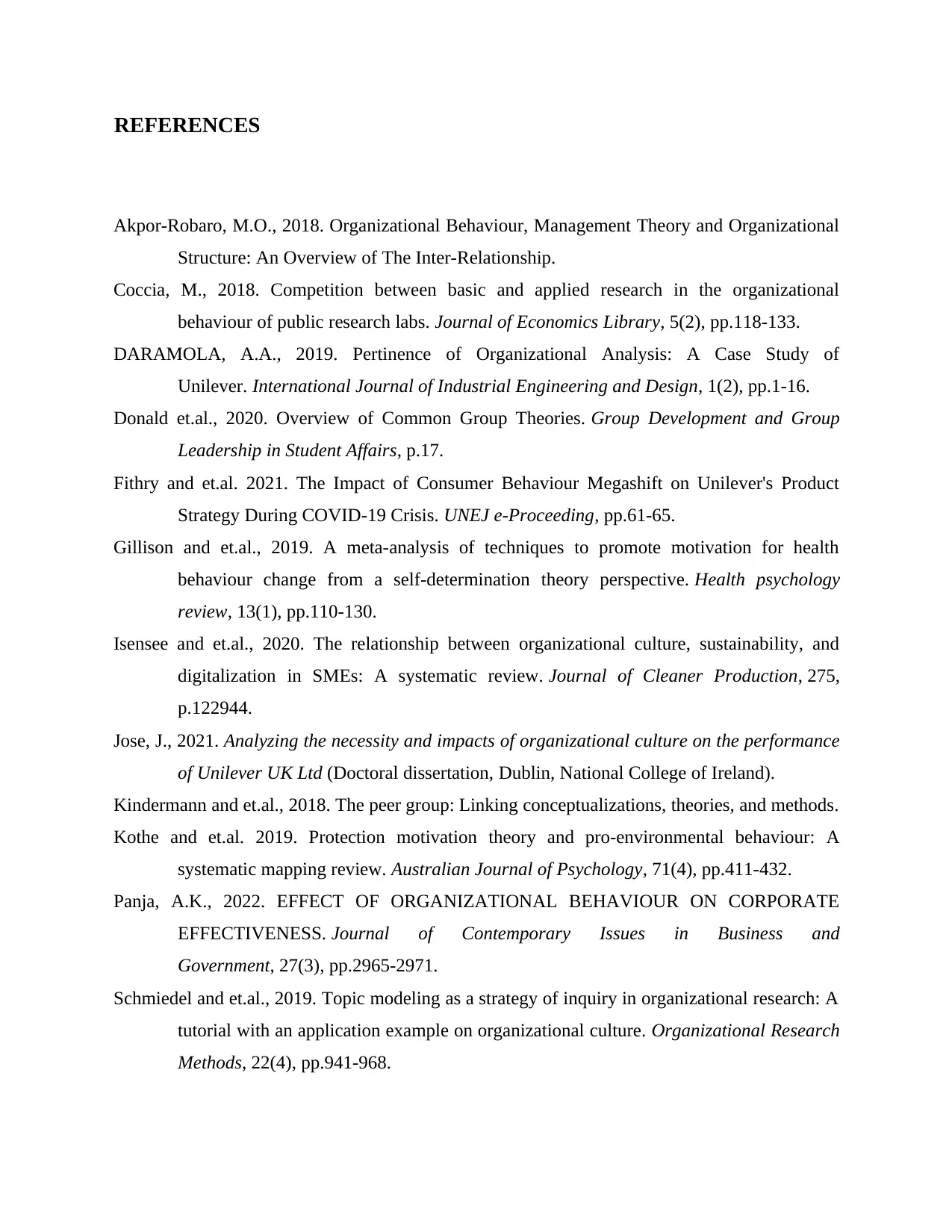
REFERENCES
Akpor-Robaro, M.O., 2018. Organizational Behaviour, Management Theory and Organizational
Structure: An Overview of The Inter-Relationship.
Coccia, M., 2018. Competition between basic and applied research in the organizational
behaviour of public research labs. Journal of Economics Library, 5(2), pp.118-133.
DARAMOLA, A.A., 2019. Pertinence of Organizational Analysis: A Case Study of
Unilever. International Journal of Industrial Engineering and Design, 1(2), pp.1-16.
Donald et.al., 2020. Overview of Common Group Theories. Group Development and Group
Leadership in Student Affairs, p.17.
Fithry and et.al. 2021. The Impact of Consumer Behaviour Megashift on Unilever's Product
Strategy During COVID-19 Crisis. UNEJ e-Proceeding, pp.61-65.
Gillison and et.al., 2019. A meta-analysis of techniques to promote motivation for health
behaviour change from a self-determination theory perspective. Health psychology
review, 13(1), pp.110-130.
Isensee and et.al., 2020. The relationship between organizational culture, sustainability, and
digitalization in SMEs: A systematic review. Journal of Cleaner Production, 275,
p.122944.
Jose, J., 2021. Analyzing the necessity and impacts of organizational culture on the performance
of Unilever UK Ltd (Doctoral dissertation, Dublin, National College of Ireland).
Kindermann and et.al., 2018. The peer group: Linking conceptualizations, theories, and methods.
Kothe and et.al. 2019. Protection motivation theory and pro‐environmental behaviour: A
systematic mapping review. Australian Journal of Psychology, 71(4), pp.411-432.
Panja, A.K., 2022. EFFECT OF ORGANIZATIONAL BEHAVIOUR ON CORPORATE
EFFECTIVENESS. Journal of Contemporary Issues in Business and
Government, 27(3), pp.2965-2971.
Schmiedel and et.al., 2019. Topic modeling as a strategy of inquiry in organizational research: A
tutorial with an application example on organizational culture. Organizational Research
Methods, 22(4), pp.941-968.
Akpor-Robaro, M.O., 2018. Organizational Behaviour, Management Theory and Organizational
Structure: An Overview of The Inter-Relationship.
Coccia, M., 2018. Competition between basic and applied research in the organizational
behaviour of public research labs. Journal of Economics Library, 5(2), pp.118-133.
DARAMOLA, A.A., 2019. Pertinence of Organizational Analysis: A Case Study of
Unilever. International Journal of Industrial Engineering and Design, 1(2), pp.1-16.
Donald et.al., 2020. Overview of Common Group Theories. Group Development and Group
Leadership in Student Affairs, p.17.
Fithry and et.al. 2021. The Impact of Consumer Behaviour Megashift on Unilever's Product
Strategy During COVID-19 Crisis. UNEJ e-Proceeding, pp.61-65.
Gillison and et.al., 2019. A meta-analysis of techniques to promote motivation for health
behaviour change from a self-determination theory perspective. Health psychology
review, 13(1), pp.110-130.
Isensee and et.al., 2020. The relationship between organizational culture, sustainability, and
digitalization in SMEs: A systematic review. Journal of Cleaner Production, 275,
p.122944.
Jose, J., 2021. Analyzing the necessity and impacts of organizational culture on the performance
of Unilever UK Ltd (Doctoral dissertation, Dublin, National College of Ireland).
Kindermann and et.al., 2018. The peer group: Linking conceptualizations, theories, and methods.
Kothe and et.al. 2019. Protection motivation theory and pro‐environmental behaviour: A
systematic mapping review. Australian Journal of Psychology, 71(4), pp.411-432.
Panja, A.K., 2022. EFFECT OF ORGANIZATIONAL BEHAVIOUR ON CORPORATE
EFFECTIVENESS. Journal of Contemporary Issues in Business and
Government, 27(3), pp.2965-2971.
Schmiedel and et.al., 2019. Topic modeling as a strategy of inquiry in organizational research: A
tutorial with an application example on organizational culture. Organizational Research
Methods, 22(4), pp.941-968.
⊘ This is a preview!⊘
Do you want full access?
Subscribe today to unlock all pages.

Trusted by 1+ million students worldwide
1 out of 14
Related Documents
Your All-in-One AI-Powered Toolkit for Academic Success.
+13062052269
info@desklib.com
Available 24*7 on WhatsApp / Email
![[object Object]](/_next/static/media/star-bottom.7253800d.svg)
Unlock your academic potential
Copyright © 2020–2026 A2Z Services. All Rights Reserved. Developed and managed by ZUCOL.




